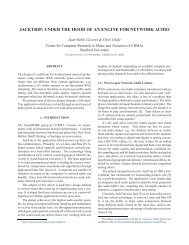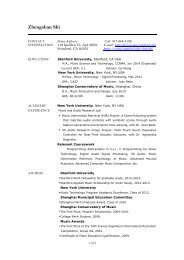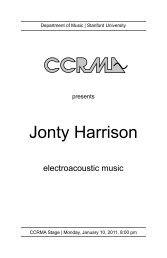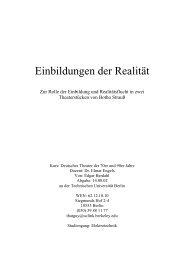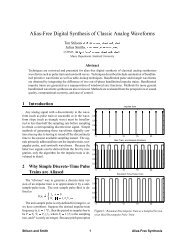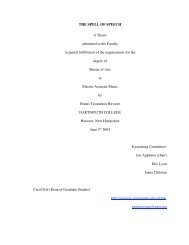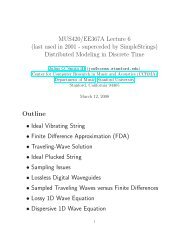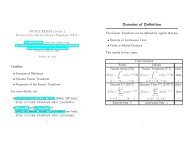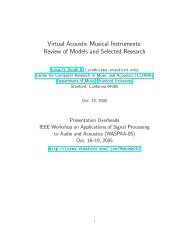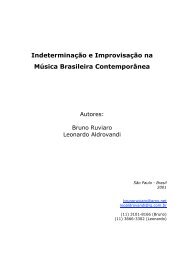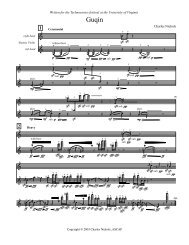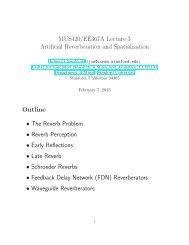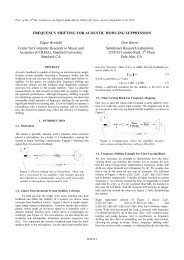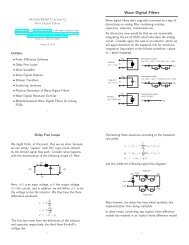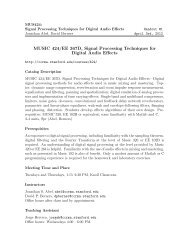Download - CCRMA - Stanford University
Download - CCRMA - Stanford University
Download - CCRMA - Stanford University
Create successful ePaper yourself
Turn your PDF publications into a flip-book with our unique Google optimized e-Paper software.
• Music 151 Psychophysics and Cognitive Psychology for Musicians.<br />
Basic concepts and experiments relevant to use of sound, especially synthesized, in music. Introduction<br />
to elementary concepts: no previous background assumed. Listening to sound examples<br />
important. Emphasis on salience and importance of various auditory phenomena in music.<br />
• Music 154 History of Electroacoustic Music.<br />
Survey of the development of music technology. Analysis and aesthetics of electronic music.<br />
• Music 192. Theory and Practice of Recording<br />
- 192A. Foundations of Sound Recording Technology.<br />
Topics: elementary electronics, physics of transduction and magnetic recording of sound,<br />
acoustic measurement techniques, operation and maintenance of recording equipment, recording<br />
engineering principles, microphone selection and placement, grounding and shielding techniques.<br />
- 192B. Advanced Sound Recording Technology.<br />
Topics: digital audio including current media, formats, editing software, post-processing techniques,<br />
noise reduction systems, advanced multi-track techniques, dynamic range processing<br />
and delay-based effects.<br />
- 192C. Session Recording.<br />
Independent engineering of recording sessions.<br />
• Music 220. Computer-Generated Music<br />
- Music 220A. Fundamentals of Computer-Generated Sound.<br />
Techniques for digital sound synthesis, effects, and reverberation. Topics: summary of digital<br />
synthesis techniques (additive, subtractive. nonlinear, modulation, wavetable. granular,<br />
spectral-modeling, and physical-modeling): digital effects algorithms (phasing, flanging, chorus,<br />
pitch-shifting, and vocoding): and techniques for digital reverberation.<br />
- Music 220B. Compositional Algorithms, Psychoacoustics, and Spatial Processing.<br />
Use of high-level programming as a compositional aid in creating musical structures. Studies<br />
in the physical correlates to auditory perception, and review of psychoacoustic literature.<br />
Simulation of a reverberant space and control of the position of sound within the space.<br />
- 220C. Seminar in Computer Music Research.<br />
Individual projects in composition, psychoacoustics. or signal processing.<br />
- 220D. Research.<br />
Independent research projects in composition, psychoacoustics, or signal processing.<br />
• Music 252. Seminar: Topics in Computer Music.<br />
Various topics according to interest.<br />
• Music 253. Musical Information: An Introduction.<br />
Explores the diverse kinds of the musical information used in sound, graphical, and analytical<br />
applications. Device-independent concepts and principles in music representation and musical<br />
research objectives (repertory analysis, performance analysis, theoretical models, similarity and<br />
stylistic simultaion) will be emphasized. Examples will be drawn primarily from Western art<br />
music.<br />
• Music 254. Musical Representation and Computer Analysis: Seminar.<br />
Offers an opportunity for participants to explore issues introduced in Music 253 in greater depth<br />
and to take initiative for research projects related to a theoretical or methodological issue. ;i<br />
software project, or a significant analytical result.<br />
Id



